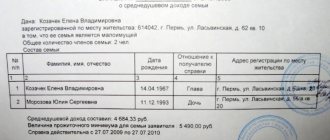Definition of the concept
Article 137 of the RF IC states that adoption is a legal procedure for the emergence of a special relationship between the adoptive parents and the adoptee.
They are equal by law to the relationship between parents and children.
Article 139 of the Family Code of the Russian Federation explains that judges and other officials who participated in the adoption procedure must conceal this information and not tell the child about it.
This is the secret of adoption. However, if the new parents themselves are not against the baby knowing about his origin, then there is no violation of the law.
Immediately after the court decision on adoption comes into force, responsibility for disclosing the secret begins. This is how the law protects the child from violation of his rights and the dissemination of confidential information.
Important: if the child is 10 years old, the secrecy of adoption ceases to be valid. At this age, the child must decide for himself whether he will go to a foster family or not.
and All civil servants have a clause in their job descriptions, according to which they must keep confidential information secret. In this regard, it is much easier to prove their guilt.
Why should you keep a secret?
The Basic Law of the State establishes the right of every person to personal and family secrets (Article 23 of the Constitution of the Russian Federation). When deciding to adopt, parents accept responsibility for the child, including his physical and mental health.
The main reasons for keeping secrets are:
- protection from attempts to remove the baby;
- protecting the family from excessive attention from strangers;
- ensuring psychological comfort;
- protection from interference of biological parents in raising a child.
The advantage of keeping a secret is that minors recognize that they belong to a family. In addition, when inheriting, the child has the same rights along with other close relatives.
Reasons for the need for confidentiality
The main reason is the protection of the rights of the child and his legitimate interests. In addition, parents, hiding the truth, are guided by the desire to prevent injury: psychological or emotional. Sometimes disclosure even entails the cancellation of the adoption, since it becomes unbearable for the child to live in a family in which the fact of his adoption was hidden.
Ensuring secrecy
Article 139 of the RF IC provides a whole range of measures that would help parents keep the fact of adoption secret.
For example, it provides the following:
- holding a trial in closed form, i.e. A strictly limited list of persons related to the procedure is invited to the process.
- At the request of the parents, you can change: the child’s full name, his place of birth.
- It is not the biological parents who are entered into the birth book, but the adoptive parents.
- You can change the date of birth, but for a period of no more than 3 months. Important condition: the child should not be more than a year old. Also, such a decision is made only in court at the hearing at which the issue of adoption is considered.
What punishment and responsibility are provided?
Art. 155 of the Criminal Code of the Russian Federation regulates the following preventive measures for this offense:
- imprisonment for up to 4 months. ;
- correctional labor for up to 12 months. ;
- imposition of a fine in the amount of up to 80 thousand rubles.
Disclosure of the secret of adoption
There are 2 types of disclosure of secrets.
Depending on the nature of the disclosure, the punishment or lack thereof depends:
- intentional.
- Accidental or caused by a combination of life circumstances.
Let's look at each type in more detail.
Deliberate
This means:
- communication of information about adoption to third parties without the consent of the adoptive parents.
- Disclosure of information for the purpose of obtaining personal gain.
Random
It also happens that a child, although not yet 10 years old, remembers his real, biological parents. In this case, there is simply no point in keeping the adoption secret.
Sometimes foster carers, for pedagogical, ethical or moral reasons, themselves tell the child about his origin, or tell others to provide details.
In addition, if the child has reached 10 years of age and participated in the trial, then, naturally, he is aware of what happened, so there is no point in keeping the adoption secret.
Judicial practice in 2021
Most often, according to Art. 155 of the Criminal Code of the Russian Federation, other persons are involved - relatives, friends, strangers. Persons holding positions in courts, guardianship and trusteeship bodies are subject to liability much less frequently.
This is due to the fact that the latter are more aware of the consequences of such actions and value their official position.
Disclosure of the secret of adoption, as a rule, is addressed specifically to the child . Other people are most often not told such information simply because it is of no value to them.
Particularly difficult in practice is the issue of proving the selfish motives of violators or their base motives.
The Resolution of the Plenum of the Armed Forces of the Russian Federation No. 56 “On judicial practice in cases of extortion” explains that vile actions that disgrace the victim should be understood as the following behavior:
- Actions discrediting honor and dignity, undermining reputation;
- Knowingly false reports;
- Reports made for the purpose of profit;
- Disclosure of information that negatively affects the psychological and moral state of the victim, etc.
The secrets of adoption are information that should not concern anyone other than two family members who have decided to raise someone else’s child. Gossip against the backdrop of the secrecy of adoption is unacceptable and punishable.
This is not just an excuse to talk and discuss the personal family life of other people, it is a violation of criminal law, an unacceptable action that reflects the low culture of the offender and is subject to real punishment.
Who is the subject of disclosure of secrets?
Before the adoption procedure, all participants are warned about the consequences of disclosing information. They are the subjects. This concept is specified below.
To the subjects, i.e. Persons who are responsible for disclosing information without the consent of the adoptive parents include certain people:
- judges and judicial staff.
They are subject to Article 139 of the RF IC in case of disclosure of information without the knowledge of their parents. - Persons who recorded what happened in acts and books.
Civil registry office employees must register the adoption in accordance with Federal Law No. 143, Article 39. Accordingly, they are also responsible for disclosing information. - Health workers. They can access adoption information through the child's medical history.
- Relatives of the adopted child or adoptive parents. Statistics show that 46% of cases of violations are the responsibility of relatives, 14% were caused by acquaintances or teachers. Only about 4% of their number were brought to trial for criminal charges.
- Casual acquaintances who know the information.
- Employees of state guardianship authorities. They must keep secrets, but upon judicial or prosecutorial requests, they are obliged to disclose information.
Alas, it is unknown how to find out about the source who told the child that he was adopted. Often parents realize too late that their baby knows too much.
This is why the percentage of people punished for disclosing information is so small. However, it is never too late to punish a criminal, because the law does not establish a statute of limitations.
All civil servants have a clause in their job descriptions, according to which they must keep confidential information secret. In this regard, it is much easier to prove their guilt.
But with relatives and friends everything is more complicated. After all, the court will need to provide evidence of the selfish motives of the latter.
Mystery and consequence: why it is important for a child to know that he is adopted
The secrecy of adoption remains one of the important and controversial topics. Introduced in 1969, the law prohibits the disclosure of information about the adoption of a child to anyone without the consent of the adoptive parents. And in an individual family, the law turns into a question that moms and dads decide for themselves: should the child know that he is adopted? Parents and experts shared their experiences and opinions with the Change One Life Foundation.
Opinions of adoptive parents
Anastasia, Moscow:
“I am raising a girl whose biological mother is serving time in prison. Nastya, her adopted daughter, knows about her existence, they sometimes call each other. And she considers having both mothers to be a wrong thing. He says he loves both her and me.
At the same time, the girl is embarrassed to talk about her blood mother. And when asked who your mother is, Nastya calls me. She knows that her blood mother gave birth to her, but she wants to think and believe that it was me who gave birth to her. And I myself don’t want to convince Nastya, since she decided so for herself. I believe that there is no need to alienate children from oneself with such concepts as “adoptive parent”, “step-child”.
The secret of adoption is needed. I am raising all three children under a guardianship agreement, but I plan to adopt. And, probably, in the future I will not reveal the secret to the other children.
Many orphans have parents who are drug addicts and alcoholics. Why do they need to know that their fathers and mothers drank, took drugs, and committed crimes?
HELP CHILDREN FROM ORPHANAGES FIND A FAMILY
The biological mother of one of my sons was on drugs, and most likely she is no longer alive. Does a child need to know all this? I am not sure".
Olga Shchegoleva, Samara:
“My eldest daughter was three months old when I took her into the family. Acquaintances and friends knew that she was adopted. When the girl turned 7 years old, I thought about telling her the truth about her birth family. By nature, my daughter is a maximalist, and it would be better to get information about her blood family from me than from strangers.
We went to psychologists who immediately said: you came on time. At a later age, a child, having learned the truth, can make many mistakes. Experts consider the most optimal age for such revelations to be from 6 to 9 years.
Read the story of Olga Shchegoleva - “The arrival of a child in a family is the point of no return”
When I told my daughter that she was not my family, she cried. The fact that we ended up being her foster parents upset her. As a teenager, she began asking questions regarding her birth mother. But I didn't have any detailed information.
Now my daughter is 17 years old, and we have a very close relationship. Any secret carries a lie that cannot benefit a person.”
Nadezhda Afanasyeva, Moscow:
“Everyone has the right to know about themselves, their origins. And it’s better to know about this from early childhood. In adolescence, accepting the truth can be very painful. If a child knows from a young age that he is adopted and grows up with this thought, then it will be easier for him to live in the future.
My daughter came to our family when she was one and a half years old. Six months later, my husband and I made a photo book: the first pages are photographs from the orphanage, how we picked her up, her first days at home, her first walks with her brothers and sisters. The book is written in the form of a fairy tale: a girl got lost, but a stork found her and brought her to us. I think that until she’s 7-8 years old, this story will still be in demand, and then, gently and gradually, we will tell our daughter about our adoptive family.
There is practically no information about the biological mother. She abandoned her daughter on the second day after giving birth; only this woman’s passport information is available. If you want, you can find it. But now my daughter doesn’t show much interest in this topic; it seems to me that she is still too young to understand this.”
Expert opinions
Yana Leonova, director of the “Change One Life” foundation:
“The secrecy of adoption is indeed protected by law, but it concerns judges who made a decision on the adoption of a child, officials who carried out state registration of adoption, as well as persons otherwise aware of adoption (Article 139 of the Family Code of the Russian Federation).
Of course, the decision to reveal the secret of adoption to the outside world belongs only to the family, based on the interests of the family itself and the child. But as far as keeping a secret for the child himself is concerned, it is still not so clear.
It is a big responsibility to decide to build a relationship with a child in the context of concealing such an important event. This is a lot of stress for all family members.
The anxiety and fears of parents are understandable, it’s just important to decide for yourself - are you ready to hide his past from your child for the rest of your life, are you ready for the fact that it will most likely be revealed, because a large number of people, one way or another, know about this: from courts, guardianship authorities to clinics, the Federal Migration Service and other authorities.
It turns out that sooner or later the child will find out. And the reaction can be very different, but for him it is always shock and stress. According to reviews from adult adoptees, these were painful experiences, questions, and absolute confusion because their picture of the world, which had been carefully built by their adoptive parents who were trying to keep the secret, had collapsed.
Before making a decision, it is still important not to forget about the child’s right to know his origin, roots and history (the same Family Code talks about this). It is also necessary to familiarize yourself with different methods and techniques for revealing secrets, consult with specialists, try to agree on support for this process, perhaps this will relieve your anxiety regarding the method of presenting information. Of course, there are many difficult events in the past of adopted children, but you can learn to talk about them correctly.
It is important to remember that a child still keeps a lot of his childhood in his memory and subconscious, even if it is not always possible to say it, he remembers his feelings and sensations. The child needs his parents to share his feelings, explain and help him survive them.”
Elena Alshanskaya, President of the Volunteers to Help Orphans Charitable Foundation:
“There is nothing we don’t know about ourselves. Everything that happened to us is known to our body, our organism. In addition to the conscious part, there is a huge layer of information that we are not aware of or do not remember. For example, we most often do not remember ourselves at all until we are four years old. But some events that we don’t even remember can be severe triggers of some traumatic sensations.
That is, our brain, of course, knows everything that happened to us, but only a small part of it is in our actual memory. When the brain begins to receive information from loved ones about reality that contradicts what it knows, a person very often begins to feel uncomfortable or suspect something. This can lead to severe conditions in adolescence and beyond.
In addition, relationships between loved ones should not be built on lies. Lies are difficult to maintain; it requires a lot of energy and constant self-control. What real and sincere relationship can withstand the constant big lie that must be hidden every day? And there is always a risk that someone will tell the truth: a grandmother-neighbor, a clinic employee. Or the parent himself will blurt out in anger: “if you were my child, you wouldn’t do that.”
The later a person finds out about this, the more severe the consequences for him. Because his whole life instantly collapses, everything on which it was based, the understanding of who you are turns out to be untrue. The feeling that your whole life is a lie is very difficult for an adult. While a small child receives information gradually and in a form accessible to him, and this does not cause him any strong negative emotions. You can tell him how one mother gave birth, but could not raise her, a second mother was found who was able to be a mother and took her in.
In addition, every person has the right to know the truth about himself. Who he is and where he comes from is part of his personality. No one has the right to hide essential information about himself from another person.”
Taisiya Lotareva, educational psychologist at the Center for Promoting Family Education “Our Home”:
“The secret of adoption is a delicate and multifaceted topic. A secret from a child in a family is one issue in which psychologists most often help family members overcome anxieties associated with not wanting to destroy the relationship with the child or damage his self-esteem, and recommend not hiding the fact of his “adoption” from him. In addition, the consequences of unexpected disclosure of a secret are usually more traumatic for all family members.
There are also factors of the child's age and the parents' willingness and ability to discuss the child's life history. Psychological support for the family also helps in these matters.
But, perhaps, the most difficult problem at the moment remains the problem of the adopted child’s relationship with society: teachers, classmates, parents of classmates... Often the child is faced with non-acceptance and unpreparedness of society to meet an orphan and an adoptive family.
Orphans are still feared and disliked. It is this situation that requires teachers to comply with ethical rules regarding the non-dissemination of information about the fate of a child if this threatens unsafe consequences for him, as well as very correct work with students and their parents, aimed at integrating the orphan child into the classroom and school team.”
Abolition of the secrecy of adoption
The Secrecy Act was passed back in 1969. Now it can be called more of a relic of the past than a real necessity.
Western countries have long abandoned the mandatory secrecy of a child's adoption. In Russia they only think about it.
In 2011, when the National Strategy for the Development of Actions aimed at improving the well-being of children was being developed, officials wrote down a clause in the document: “On the abandonment of the secrecy of adoption and the transition to an open system.”
Naturally, for many this became a kind of revolution. The strategy was created for the period 2012-2017.
Until the bill is adopted, parents can themselves abolish the secret by simply disclosing to their child information about his birth. Naturally, when disclosing such data, it is worth considering whether it will cause emotional and psychological trauma to the child.
If parents plan to reveal the secret, then at what age is it best to do this?
It is also not too late to tell your child that he is adopted between the ages of three and seven. This is the time when babies usually ask questions about birth. Using simple words you can explain everything to your baby.
Are there grounds for disclosure after the death of the adoptive parents?
On June 17, 2015, a historical event occurred in Russia. By its decision, the Constitutional Court partially abolished the secrecy of adoption.
According to his decree, after the death of the adoptive parents and if there are substantial grounds, the child can find out about his origin.
Such reasons may be: the desire to avoid marriage with blood relatives or to prevent the transmission of a hereditary disease.
Important: The Constitutional Court especially emphasized that the death of educators in itself is not grounds for divulging the secret of adoption. Only if you need to find out the genetic history of your ancestors.
The corpus delicti under Art. 155 of the Criminal Code of the Russian Federation
In order for the crime to be qualified under Art. 155 of the Criminal Code of the Russian Federation, it is necessary that information about adoption goes beyond the circle of people who are aware of it.
Simply put, if a guardianship employee wrote a letter about an adopted child to a PDN employee who already knows her, this will not be considered a crime.
The crime is as follows:
- The object of the criminal act is private, family secrets, the interests of parents and children.
- The objective side involves disclosing the secret to at least one person, including the adopted child himself. The main feature is the lack of consent of the adoptive parents to this act. Often the threat of disclosing a secret becomes associated with extortion, which will be qualified in conjunction with other articles of the Criminal Code of the Russian Federation
- Direct intent characterizes the subjective side. The person committing the crime is aware that he has no right to do so, but still acts in a certain way.
- The subject of a crime can be a person over 16 years of age. A common subject in the form of teachers, educators and other persons divulges the secret for selfish or other base motives. The special subjects are judges, guardianship and trusteeship officers.
It will not be recognized as a criminal offense to disclose the secret of adoption by the adoptive parents themselves or other persons at their request.
All participants in the judicial process, in which issues related to adoption are considered, must be warned about the prohibition of disclosing the secret of adoption and the possibility of bringing them to criminal liability in the event of disclosure.
All court hearings considering adoption issues are held behind closed doors.





